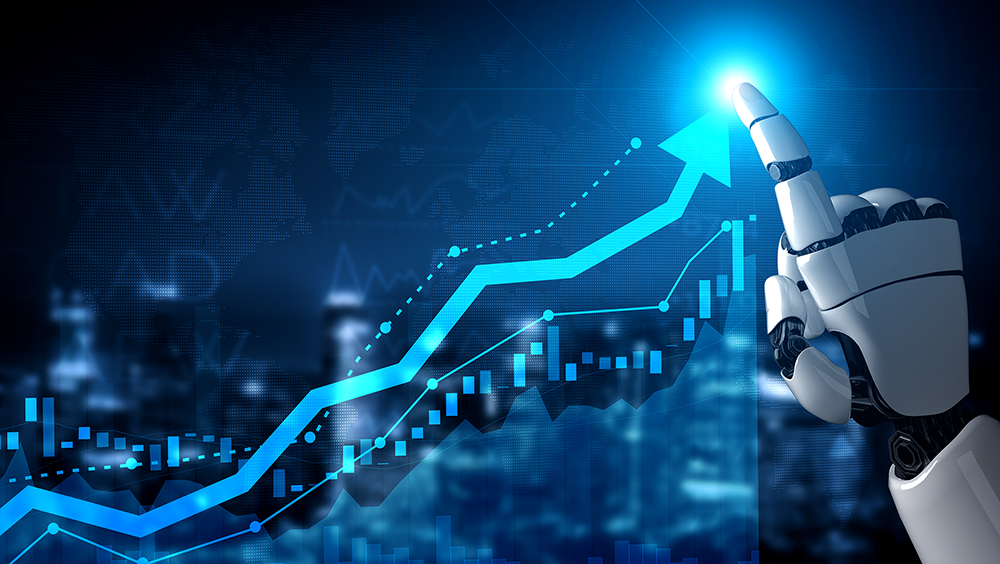How AI is transforming the global financial markets: A Deep Dive

Delving into the realm of AI and its impact on global financial markets, this exploration promises to unveil the intriguing fusion of technology and finance. Brace yourself for a journey filled with revolutionary advancements and game-changing insights.
The content of the second paragraph that provides descriptive and clear information about the topic
Overview of AI in financial markets

Artificial Intelligence (AI) has been revolutionizing the global financial markets by enabling faster, more accurate, and data-driven decision-making processes. AI technologies such as machine learning, natural language processing, and predictive analytics are being utilized to analyze vast amounts of financial data in real-time, providing valuable insights and predictions for traders and investors.
Role of AI in transforming global financial markets
AI is transforming global financial markets by automating repetitive tasks, detecting patterns in data, and optimizing investment strategies. For example, AI-powered algorithms can analyze market trends, predict stock prices, and even execute trades without human intervention, leading to increased efficiency and profitability in the financial sector.
Examples of AI in the financial sector
Robo-advisors
AI-powered platforms that provide automated investment advice based on individual financial goals and risk tolerance.
Fraud detection
AI algorithms can identify suspicious transactions and patterns to prevent financial fraud.
Algorithmic trading
AI-driven trading algorithms can execute high-frequency trades at speeds impossible for humans to achieve.
Benefits of AI adoption in financial markets
AI adoption in financial markets leads to improved accuracy in decision-making, reduced operational costs, increased speed of transactions, and enhanced risk management. By leveraging AI technologies, financial institutions can gain a competitive edge in the market and deliver better services to their clients.
Impact of AI on decision-making processes in financial institutions
AI has revolutionized decision-making processes in financial institutions by providing real-time insights, automating tasks, and enhancing predictive capabilities. With AI, financial professionals can make informed decisions based on data-driven analysis, reducing human error and improving overall performance in the fast-paced world of finance.
AI-powered trading strategies
AI has completely transformed trading strategies in financial markets by leveraging advanced technologies such as machine learning algorithms and predictive analytics. These innovative tools have revolutionized the way traders analyze data, make decisions, and execute trades in real-time.
Machine Learning Algorithms for Predictive Analytics
Machine learning algorithms play a crucial role in predictive analytics for trading. These algorithms can analyze vast amounts of historical and real-time data to identify patterns, trends, and anomalies that human traders may overlook. By utilizing machine learning, traders can make more informed decisions and predict market movements with higher accuracy.
- Machine learning algorithms can process data at a much faster pace than humans, enabling traders to react to market changes in real-time.
- These algorithms can adapt to changing market conditions and continuously learn from new data, improving their predictive capabilities over time.
- By leveraging predictive analytics, traders can identify profitable trading opportunities and mitigate risks more effectively.
Advantages and Challenges of AI-based Trading Systems
AI-based trading systems offer several advantages, such as increased efficiency, reduced human error, and the ability to analyze vast amounts of data quickly. However, there are also challenges associated with these systems, including the risk of technical glitches, algorithmic biases, and potential regulatory concerns.
- Advantages:
- Improved speed and efficiency in executing trades.
- Enhanced accuracy in predicting market trends.
- Ability to analyze complex data sets and identify trading opportunities.
- Challenges:
- Risk of technical failures or system crashes.
- Potential biases in algorithmic decision-making.
- Regulatory challenges related to the use of AI in trading.
Comparison of Traditional Trading Methods with AI-driven Strategies
When comparing traditional trading methods with AI-driven strategies, it becomes evident that AI offers several advantages that traditional methods cannot match. AI-driven strategies can analyze data more effectively, make faster decisions, and adapt to changing market conditions seamlessly.
- AI-driven strategies can process vast amounts of data and identify patterns that human traders may miss.
- AI can execute trades at lightning speed, taking advantage of market opportunities before human traders can react.
- AI-driven strategies can minimize emotional bias in decision-making and stick to predetermined rules consistently.
Risk management and compliance

AI is revolutionizing risk management practices in financial institutions by providing advanced analytics and predictive capabilities. By leveraging AI algorithms, institutions can analyze vast amounts of data in real-time to identify potential risks and take proactive measures to mitigate them.
Enhancing compliance with regulatory requirements
AI plays a crucial role in improving compliance with regulatory requirements by automating processes and ensuring adherence to complex rules and regulations. AI-powered systems can monitor transactions, detect suspicious activities, and generate reports to meet regulatory standards efficiently.
AI tools for fraud detection and prevention
Financial markets rely on AI tools for fraud detection and prevention to combat increasingly sophisticated fraudulent activities. Machine learning algorithms can analyze patterns in data to identify anomalies, flag suspicious transactions, and prevent fraudulent activities before they occur.
Importance of AI in ensuring data security and privacy
AI technologies are essential for safeguarding data security and privacy in financial markets. AI-powered cybersecurity tools can detect and respond to potential threats in real-time, protect sensitive information from cyber attacks, and ensure compliance with data protection regulations.
Customer experience and personalization
AI is revolutionizing customer experience in the financial industry by enabling personalized interactions and tailored services that cater to individual needs. Through the use of AI technologies, financial institutions are able to enhance customer satisfaction, improve engagement, and build stronger relationships with their clients.
AI Chatbots and Virtual Assistants
AI chatbots and virtual assistants are being increasingly utilized in the financial industry to provide round-the-clock customer service and support. These AI-powered tools can efficiently handle customer inquiries, offer real-time assistance, and streamline the resolution of issues. By leveraging natural language processing and machine learning algorithms, chatbots can engage with customers in a personalized manner, offering relevant information and guidance.
Personalized Financial Recommendations
AI is empowering financial institutions to deliver personalized financial recommendations to their clients based on their individual preferences, behavior, and financial goals. By analyzing vast amounts of data, AI algorithms can identify patterns, predict trends, and offer tailored investment advice, product recommendations, and financial planning strategies.
This level of personalization enhances the overall customer experience and fosters trust and loyalty.
Impact on Customer Retention and Loyalty
The implementation of AI in the financial sector has a significant impact on customer retention and loyalty. By providing personalized services, proactive support, and customized recommendations, financial institutions can strengthen their relationships with clients and increase customer satisfaction. AI enables a deeper understanding of customer needs and preferences, allowing for targeted marketing strategies and improved customer engagement.
Ultimately, this leads to higher levels of customer retention and loyalty, as clients feel valued and well-cared for by their financial service providers.
Final Review

As we conclude our discussion on how AI is reshaping the landscape of financial markets worldwide, it's evident that the future is indeed intertwined with artificial intelligence. The possibilities are endless, and the transformation is unstoppable.
Expert Answers
How is AI currently being used in the financial sector?
AI is utilized in tasks such as algorithmic trading, fraud detection, customer service chatbots, and personalized financial recommendations.
What are the benefits of AI adoption in financial markets?
Benefits include enhanced decision-making, improved risk management, increased efficiency, and personalized customer experiences.
How does AI revolutionize trading strategies?
AI-driven strategies leverage machine learning algorithms for predictive analytics, providing insights for more informed trading decisions.
What are the challenges of AI-based trading systems?
Challenges include data privacy concerns, potential algorithm biases, and the need for continuous monitoring and updates.
How does AI enhance risk management practices in financial institutions?
AI improves risk assessment through real-time data analysis, anomaly detection, and predictive modeling to mitigate potential threats.

